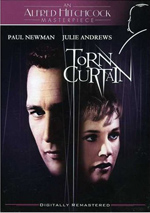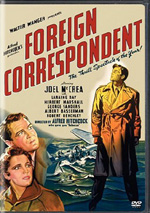|
FOX
|

| |
|
MOVIE INFO
|
|
Director:
Alfred Hitchcock
Cast:
Paul Newman, Julie Andrews, Lila Kedrova, Hansjörg Felmy, Tamara Toumanova, Wolfgang Kieling, Ludwig Donath, Günter Strack
Writing Credits:
Brian Moore
Tagline:
It tears you apart with suspense!
Synopsis:
Paul Newman and Julie Andrews star in what must unfortunately be called one of Alfred Hitchcock's lesser efforts. Still, sub-par Hitchcock is better than a lot of what's out there, and this one is well worth a look. Newman plays cold war physicist Michael Armstrong, while Andrews plays his lovely assistant-and-fiancée, Sarah Sherman. Armstrong has been working on a missile defense system that will "make nuclear defense obsolete," and naturally both sides are very interested. All Sarah cares about is the fact that Michael has been acting awfully fishy lately. The suspense of Torn Curtain is by nature not as thrilling as that in the average Hitchcock film - much of it involves sitting still and wondering if the bad guys are getting closer. Still, Hitchcock manages to amuse himself: there is some beautifully clever camera work and an excruciating sequence that illustrates the frequent Hitchcock point that death is not a tidy business.
Box Office:
Budget
$6 million.
MPAA:
Rated PG
| |
|
DVD DETAILS
|
Presentation:
Aspect Ratio: 1.85:1/16X9
Audio:
English Monaural
French Monaural
Subtitles:
English
Spanish
Closed-captioned
Supplements Subtitles:
English
Spanish
French
Runtime: 127 min.
Price: $19.98
Release Date: 2/7/06
Bonus:
• “Torn Curtain Rising” Documentary
• “Scenes Scored By Bernard Herrmann” Featurette
• Production Photographs
• Production Notes
• Trailer
| |
|
PURCHASE @ AMAZON.COM
|

| |
|
EQUIPMENT
|
Panasonic 50" TH-50PZ77U 1080p Plasma Monitor; Sony STR-DG1200 7.1 Channel Receiver; Panasonic DMP-BD60K Blu-Ray Player using HDMI outputs; Michael Green Revolution Cinema 6i Speakers (all five); Kenwood 1050SW 150-watt Subwoofer.
| |
|
RELATED REVIEWS
|

| |
[an error occurred while processing this directive]
|
Torn Curtain (1966)
|
|
Reviewed by Colin Jacobson (March 99, 2009)
Alfred Hitchcock opened the 1960s well with an excellent one-two punch: 1960’s Psycho and 1963’s The Birds. Unfortunately, he faltered with 1964’s unmemorable Marnie. 1966’s Torn Curtain launched the decade’s second half for Hitch – let’s see if he rebounded.
Set in Denmark, noted physicist Professor Michael Armstrong (Paul Newman) attends an international conference along with his fiancée/assistant Dr. Sarah Sherman (Julie Andrews). He didn’t want Sarah to accompany him on the trip but he won’t tell her why. To thicken the intrigue, Michael receives a mysterious cable but lies to Sarah about it, and she starts to sense that he’s hiding something from her.
When a Danish bookstore notifies him that they have a book for him, Sarah picks it up – and semi-creepy Professor Manfred (Gunter Strack) insists on accompanying her. After he gets the tome from Sarah, Michael continues to behave in an odd manner and her suspicions that something strange is afoot increase. Eventually Sarah learns that Michael plans to defect to East Germany. The film follows the intrigue as we slowly find out the truth of Michael’s intentions and work.
I don’t want to say that Hitchcock had lost it by 1966, but the combination of Marnie and Torn Curtain doesn’t leave me optimistic about his subsequent – and final – three flicks. Actually, compared to Curtain, Marnie might qualify as classic Hitch. I don’t know what went wrong here, but Curtain provides a shockingly dull experience.
I never thought I’d refer to a Hitchcock flick as “dull”, for even his lesser works offer a mix of pleasures and manage to maintain our attention. In the case of Curtain, though, I found it hard to stay focused on the story. So little material of interest popped up on screen that my mind tended to wander.
How much of this came from the script and how much resulted from Hitchcock’s lackluster direction remains up in the air. I do know that the story is a bit of a mess. I can find all sorts of simple changes that would’ve made it more compelling. For instance, the flick focuses on Michael, whereas it would’ve been more intriguing if it came from Sarah’s point of view.
There’s almost no tension about Michael’s motives, as – to my surprise - Curtain reveals these pretty early. I figured much of the movie would revolve around Sarah’s attempts – and ours – to learn the truth about Michael, but that’s barely an issue. Instead it substitutes the path he takes in East Germany without any question about his rationale.
Big mistake. This decision robs the film of much natural suspense and makes it flaccid. The story emphasizes double-dealing and relies on tight action to succeed. Perhaps a younger Hitchcock could’ve pulled that off, but at this point in his career, I guess that wasn’t possible.
Hitchcock circa 1966 creates a slow, plodding story. The flick moves at a snail’s pace and never creates excitement even during potentially dramatic scenes. Take a fight during the first half. It’s the usual life or death circumstance but it provides exceedingly little excitement. Hitchcock seems bored with the scene, and that sense pervades the movie.
On paper, Newman and Andrews seem like an interesting match, but they muster virtually no chemistry. I suppose Andrews looked at Curtain as a move toward more “adult” roles after the star-making combination of 1964’s Mary Poppins and 1965’s Sound of Music. After all, the flick’s opening scene shows here naked in bed with Newman after sex.
Given the results here, I think she should’ve stuck with roles as nannies. To be honest, she’s probably not hot enough for a legendary hunk like Newman; Andrews is attractive but plain. If she and Newman showed any spark, then I could forgive her ordinary looks, but as a couple, they’re a dud.
The same goes for Torn Curtain as a whole. The story has potential, but a clumsy script, limp direction and bad casting sabotage it. I expect much, more better from Hitchcock.
|
The DVD Grades: Picture D+/ Audio B-/ Bonus B-
|
|
Torn Curtain appears in an aspect ratio of approximately 1.85:1 on this single-sided, double-layered DVD; the image has been enhanced for 16X9 televisions. Though not unwatchable, the transfer disappointed.
Grain was a major issue. Most of the movie showed excessive grain, and that element affected the rest of the film. Sharpness seemed decent but no better. The grain tended to obscure detail, though I’m not sure it would’ve been terribly concise anyway. In general, the flick seemed acceptably well-defined but lacked much precision.
I noticed no issues with jagged edges or shimmering, but edge enhancement was noticeable. Haloes popped up with moderate regularity through the film. Source flaws were a sporadic distraction. In addition to the heavy grain, I witnessed occasional specks, marks and blemishes. These weren’t bad, though.
Colors tended to be bland. Again, the grain was an issue here, as it meant the hues were fairly flat. Granted, the film’s visual design probably would’ve kept things muted anyway, but I still thought the tones should’ve been more dynamic than they were. Blacks seemed pretty deep and tight, at least, and shadows were decent. The excessive grain and general murkiness of the transfer made it unsatisfying.
At least the monaural soundtrack of Torn Curtain has held up pretty well over the years. Music showed pretty good life given the movie’s age. The score was fairly bright and full. Effects seemed accurate and distinctive, and speech was generally natural and warm, though a little edginess occasionally crept into the proceedings. Some lines also were awkwardly looped. Nonetheless, I liked what I heard most of the time and thought the audio served a “B-“.
With that, we head to the disc’s extras. We begin with a documentary called Torn Curtain Rising. The 32-minute and 22-second program provides movie clips and archival pieces accompanied by narration; unlike almost all the other Hitchcock documentaries, this one lacks any interviews. The program looks at the project’s inspirations and its script, cast and performances, the opening credits sequence, some cinematic storytelling techniques, sets and locations, themes, score, deleted scenes, and a few other production elements.
The absence of any interview subjects puzzles and disappoints, especially since I’d think quite a few participants remain among the living. Nonetheless, the narration from Trev Broudy works quite well. He digs into different aspects of the movie in an enlightening manner that provides good insight. It’s more like a commentary than a documentary, but it remains informative.
Next comes a piece entitled Scenes Scored By Bernard Herrmann. This 14-minute and 36-second segment features music Herrmann wrote for Curtain but unused by Hitchcock. We can see a few scenes as they would’ve worked had the film kept Herrmann’s score. That makes it an interesting alternate viewpoint.
A few old standbys round out the set. In addition to the flick’s trailer, we get a collection of Production Photographs. The disc includes 133 of these, and they mix behind the scenes stills, ads, and publicity shots. As always, a lot of good images appear. Finally, some text Production Notes cover a few aspects of the flick, but they don’t reveal much.
A younger Alfred Hitchcock might not have been able to knock a flawed tale like Torn Curtain out of the park, but I’m sure he could’ve done something with it. Unfortunately, the aging Hitch failed to bring anything special to this dull, plodding flick. The DVD offers perfectly acceptable audio and some interesting extras, but picture quality disappoints. As does the film itself. Leave the forgettable Torn Curtain to the Hitchcock completists.
|
|
Viewer Film Ratings: 3 Stars | Number of Votes: 5 |
|
|

